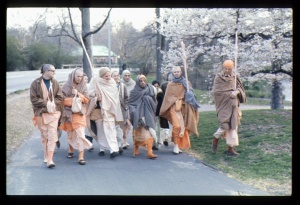SB 10.2.18

A.C. Bhaktivedanta Swami Prabhupada
TEXT 18
- tato jagan-maṅgalam acyutāṁśaṁ
- samāhitaṁ śūra-sutena devī
- dadhāra sarvātmakam ātma-bhūtaṁ
- kāṣṭhā yathānanda-karaṁ manastaḥ
SYNONYMS
tataḥ — thereafter; jagat-maṅgalam — auspiciousness for all living entities in all the universes of the creation; acyuta-aṁśam — the Supreme Personality of Godhead, who is never bereft of the six opulences, all of which are present in all His plenary expansions; samāhitam — fully transferred; śūra-sutena — by Vasudeva, the son of Śūrasena; devī — Devakī-devī; dadhāra — carried; sarva-ātmakam — the Supreme Soul of everyone; ātma-bhūtam — the cause of all causes; kāṣṭhā — the east; yathā — just as; ānanda-karam — the blissful (moon); manastaḥ — being placed within the mind.
TRANSLATION
Thereafter, accompanied by plenary expansions, the fully opulent Supreme Personality of Godhead, who is all-auspicious for the entire universe, was transferred from the mind of Vasudeva to the mind of Devakī. Devakī, having thus been initiated by Vasudeva, became beautiful by carrying Lord Kṛṣṇa, the original consciousness for everyone, the cause of all causes, within the core of her heart, just as the east becomes beautiful by carrying the rising moon.
PURPORT
As indicated here by the word manastaḥ, the Supreme Personality of Godhead was transferred from the core of Vasudeva's mind or heart to the core of the heart of Devakī. We should note carefully that the Lord was transferred to Devakī not by the ordinary way for a human being, but by dīkṣā, initiation. Thus the importance of initiation is mentioned here. Unless one is initiated by the right person, who always carries within his heart the Supreme Personality of Godhead, one cannot acquire the power to carry the Supreme Godhead within the core of one's own heart.
The word acyutāṁśam is used because the Supreme Personality of Godhead is Ṣaḍ-aiśvarya-pūrṇa, full in the opulences of wealth, strength, fame, knowledge, beauty and renunciation. The Supreme Godhead is never separated from His personal opulences. As stated in the Brahma-saṁhitā (BS 5.38), rāmādi-mūrtiṣu kalā-niyamena tiṣṭhan: the Lord is always situated with all His plenary expansions, such as Rāma, Nṛsiṁha and Varāha. Therefore the word acyutāṁśam is specifically used here, signifying that the Lord is always present with His plenary expansions and opulences. There is no need to think of the Lord artificially as yogīs do. Dhyānāvasthita-tad-gatena manasā paśyanti yaṁ yoginaḥ (SB 12.13.1). Yogīs meditate upon the Supreme person within the mind. For a devotee, however, the Lord is present, and His presence need only be awakened through initiation by a bona fide spiritual master. The Lord did not need to live within the womb of Devakī, for His presence within the core of her heart was sufficient to carry Him. One is here forbidden to think that Kṛṣṇa was begotten by Vasudeva within the womb of Devakī and that she carried the child within her womb.
When Vasudeva was sustaining the form of the Supreme Personality of Godhead within his heart, he appeared just like the glowing sun, whose shining rays are always unbearable and scorching to the common man. The form of the Lord situated in the pure, unalloyed heart of Vasudeva is not different from the original form of Kṛṣṇa. The appearance of the form of Kṛṣṇa anywhere, and specifically within the heart, is called dhāma. Dhāma refers not only to Kṛṣṇa's form, but to His name, His form, His quality and His paraphernalia. Everything becomes manifest simultaneously.
Thus the eternal form of the Supreme Personality of Godhead with full potencies was transferred from the mind of Vasudeva to the mind of Devakī, exactly as the setting sun's rays are transferred to the full moon rising in the east.
Kṛṣṇa, the Supreme Personality of Godhead, entered the body of Devakī from the body of Vasudeva. He was beyond the conditions of the ordinary living entity. When Kṛṣṇa is there, it is to be understood that all His plenary expansions, such as Nārāyaṇa, and incarnations like Lord Nṛsiṁha and Varāha, are with Him, and they are not subject to the conditions of material existence. In this way, Devakī became the residence of the Supreme Personality of Godhead, who is one without a second and the cause of all creation. Devakī became the residence of the Absolute Truth, but because she was within the house of Kaṁsa, she looked just like a suppressed fire, or like misused education. When fire is covered by the walls of a pot or is kept in a jug, the illuminating rays of the fire cannot be very much appreciated. Similarly, misused knowledge, which does not benefit the people in general, is not very much appreciated. So Devakī was kept within the prison walls of Kaṁsa's palace, and no one could see her transcendental beauty, which resulted from her conceiving the Supreme Personality of Godhead.
Commenting upon this verse, Śrī Vīrarāghava Ācārya writes, vasudeva-devakī jaṭharayor hṛdayayor bhagavataḥ sambandhaḥ. The Supreme Lord's entrance into the womb of Devakī from the heart of Vasudeva was a heart-to-heart relationship.